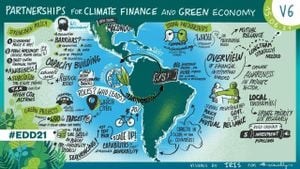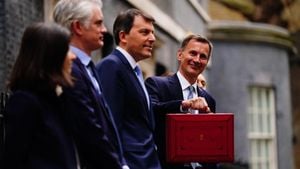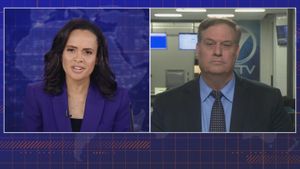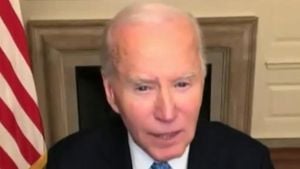California’s automotive marketplace is undergoing a significant transformation as hybrid and electric vehicle (EV) sales have surged to represent nearly 40% of the total vehicle sales within the state. Recent data from the California New Car Dealers Association shows hybrid and electric vehicles accounted for 39.4% of all new vehicle sales through the first half of 2024, signaling a notable shift among consumers. This uptick is reflective of the growing awareness and adoption of greener technologies as Californians seek alternatives to traditional gas-powered vehicles.
This remarkable increase coincides with California’s aggressive climate policies aimed at reducing greenhouse gas emissions and promoting zero-emission vehicles across the state. The emphasis on cleaner transportation is part of Governor Gavin Newsom’s vision to have 5 million zero-emission vehicles on California roads by 2030, which propelled new regulations and incentives aimed at both manufacturers and consumers.
Speaking of specific brands, Tesla continues to dominate the electric vehicle sector, with the Model Y and Model 3 being the top sellers. According to industry analysts, Tesla’s stronghold is attributed to their extensive charging network and continuous innovations, which keep consumers engaged. Further enhancing this electric vehicle battle are traditional automakers, including Ford, General Motors, and Volkswagen, who are ramping up their EV offerings, presenting consumers with more choices and higher competition.
Ford's F-150 Lightning, for example, has gained traction with consumers who are transitioning from conventional pickups to electrified models without sacrificing capability. General Motors, on the other hand, is doubling down on its efforts with the Chevrolet Bolt and the upcoming all-electric Hummer, targeting different segments of the consumer market.
The push for hybrid and electric vehicles is not restricted to the automotive sector alone; it aligns with national trends indicating increased sales for plug-in hybrid electric vehicles (PHEVs) nationwide. A report by the International Energy Agency revealed global sales of electric cars reached over 10 million units for 2023, marking more than 14% of the global vehicle market share—an impressive leap from just 4% just two years prior.
Interestingly, the rise of hybrid vehicles is also significant within the California market. Many consumers are opting for hybrids as transitional vehicles, often citing concerns over charging infrastructure and range anxiety associated with full battery electric vehicles. Unlike traditional hybrids, PHEVs allow for electric-only driving for short distances, combining the benefits of electric mode with the extended range of gasoline engines for longer trips.
According to industry expert Mark Camilleri from Jaguar Land Rover, the increasing demand for plug-in hybrids shows how customers are adapting to electrification. “PHEVs offer performance, fuel economy, and low emissions, providing consumers with the flexibility to transition to fully electric vehicles over time,” he explains.
Sales figures reveal how these preferences are shifting within the hybrid segment. JLR noted significant growth, with PHEV sales up 29% compared to the previous year, offering insights on what customers desire. Similar trends echo across other brands, with many showcasing their hybrid models, from luxury vehicles to accessible compact cars, fulfilling diverse customer needs.
The expanded availability of home charging systems has made it increasingly convenient for EV owners. With the rise of residential solar installations, some California drivers are also enjoying the benefits of charging their cars with renewable energy, coupling sustainability with savings.
Looking forward, California's automotive future is being shaped by not only technological advancements but also by consumer sentiment and political climates. The push for carbon neutrality by 2035 looms large for automakers planning their product lineups. The state’s regulations require manufacturers to make sure at least 35% of their sales are zero-emission vehicles by 2026, rising gradually to 68% by 2030 and reaching 100% by 2035. This firm timeline is prompting many companies to rethink their strategies, invest significantly, and accelerate their transitions toward electric mobility.
But it’s not just about personal consumption; public transport systems are also getting electrified. California has earmarked funds to improve EV infrastructure, launching initiatives to install charging stations throughout urban areas and along major highways to facilitate smoother transitions for all consumers.
Faced with rising fuel prices and increasing environmental awareness, it’s clear consumers are increasingly new ages of transportation—one powered by hybrid, electric, solar, and other renewable methods. Many drivers are now considering hybrids or electric vehicles as the next necessary step toward sustainability, sparking curiosity about what the future holds when more families make the switch. To be part of this green future, stakeholders must actively work to implement not only attractive new vehicles but also the infrastructure to support them.
Consumer choice is at the crux of this shift. Surveys reveal health and environmental concerns are now more prominent than ever when people are selecting new cars. Many individuals want to do their part for the environment, and for some, switching to hybrid and electric vehicles is seen as the easiest contribution they can make.
Meanwhile, auto dealers are feeling this momentum as buyers increasingly express interest. They are expediting employee training on EV technologies and charging systems, aiming to create knowledgeable environments to assist customers during their purchase decisions.
Across the board, auto manufacturers and dealerships are adapting to market shifts to accommodate the influx of hybrids and EVs. The growing variety of available models—from economy cars to luxury SUVs—is making hybrids and electric models more appealing to consumers. The collaboration between manufacturers to develop more affordable and effective solutions only augments this shift, providing the intricacies necessary to meet rising demands.
While challenges still loom large—be it infrastructure limitations, initial costs, or unproven reliability—California appears to be cruising toward a future where electric vehicles and hybrids are no longer just alternatives but become mainstream. The state has been armed with ambitious regulations, changing consumer perceptions, and powerful market innovators driving change. There's skepticism, excitement, and legitimate talks of progress toward zero emissions.
With the state paving the way, it will undoubtedly be fascinating to observe how vehicle dynamics evolve within California and beyond. Will more areas follow suit, embracing sustainable journeys? Only time will tell, but for now, California’s automotive industry is steering toward electrification like never before.



